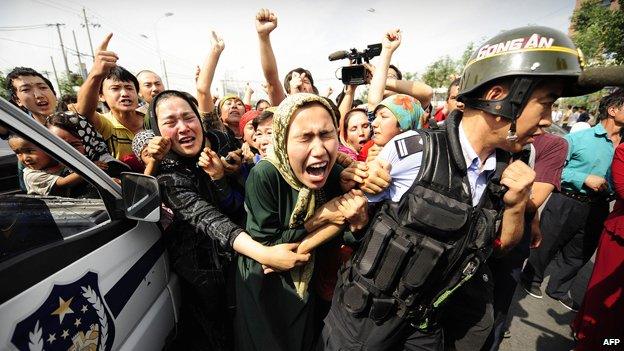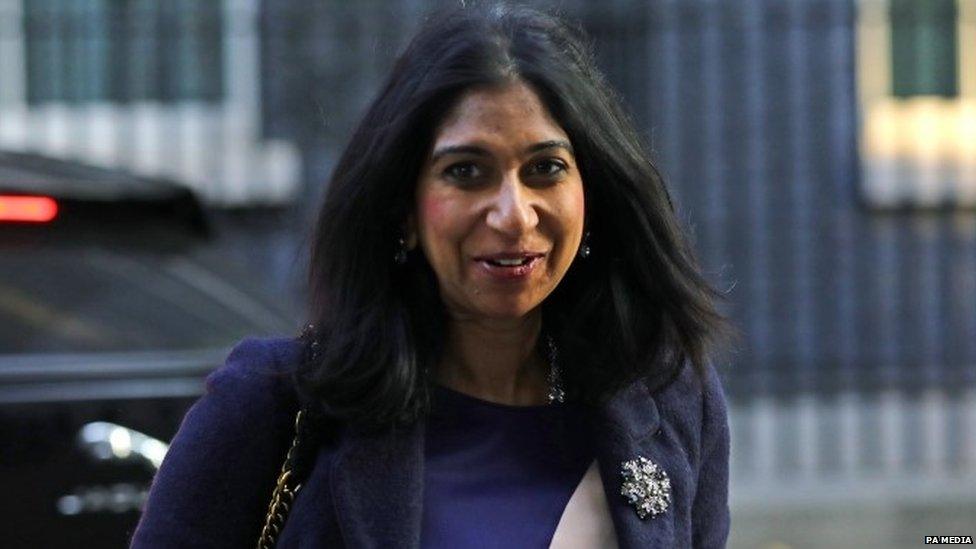The week ahead in Parliament
- Published

Welfare, education and prosecution issues could crop up as MPs discuss statutory legislation on the armed forces
It will doubtless be punctuated by pandemic statements and questions, but there's a distinct whiff of normal parliamentary service about the coming week.
There's important, but routine, business like the renewal of the Armed Forces, the up-rating of benefits and pensions, and the annual share-out of grants to councils and police authorities in England coming before MPs.
In between, the battles over Lords amendments to the Trade Bill (over genocide) and the Covert Human Intelligence Sources Bill (over child informants) continue.
Here's my rundown of the week ahead, with the usual health warning that it is based on the published agenda at the time of writing. This can be, and frequently is, overwritten if statements need to be made or Urgent Questions asked.
Monday 8 February
The Commons opens (14:30) with an hour of questions to Home Secretary Priti Patel, with post-weekend ministerial statements and Urgent Questions likely to follow.
The main business is the Second Reading of The Armed Forces Bill, and alongside it, a motion to approve the Armed Forces Act (Continuation) Order 2021.
This is a parliamentary process which has its roots in the 17th Century when, after the Civil War, Parliament guarded against the emergence of military tyranny by requiring that the very existence of the armed forces had to be confirmed by an annual vote.
This has since evolved into a system where the Commons passes an order every year under legislation that has to be renewed every five years. The legislation also underpins military law, so without the five-yearly renewal of the Armed Forces Act, the whole system of military justice would lapse, too.
The current process dates back to the 1950s, when Labour maverick George Wigg filibustered a debate on the renewal of the Armed Forces, to force the then Conservative government to reform the system.
The result was the current combination of an Act of Parliament passed every five years, under which a renewal order had to be passed annually.
The scrutiny process for the Bill is also unusual; a special bespoke select committee is appointed with powers to take evidence, including, for example, by visiting the Army's prison, the Colchester glasshouse, and to make changes.
Last time round, the exercise was quite perfunctory, but this time the new version of the Bill contains a measure intended to honour the Armed Forces Covenant, like requiring public bodies to embed it in their decision-making.
This might mean, for example, that education authorities would have to look closely at how their policies impacted the children of military families.
Another issue is whether the Bill should be used to fulfil the government's election promise to protect veterans from historic allegations arising out of their service in Northern Ireland.
The government is already legislating, in the Overseas Operations Bill, to provide protection from misconduct allegations elsewhere but the case of Northern Ireland is more problematic.
Watch out for Defence Minister Jonny Mercer, who has been the driving force behind the Overseas Operations bill but whose critics say has "not emerged as a master of the art of compromise".
And that could make that special committee rather lively.

MPs will debate the impact of successive lockdowns on the UK's zoos and aquariums
Also intriguing is the adjournment debate on "Zoos and aquaria during the Covid-19 outbreak," led by Labour's Emma Hardy, who has consistently championed their importance.
On the Committee Corridor, Public Accounts (14:30) has a session on the legacy of the Private Finance Initiative (PFI) under which successive governments paid for hundreds of new hospitals, schools, roads and other projects.
It will examine, among other things, whether PFI was, in the end, a good, or a bad bargain for the taxpayer.
Elsewhere, European Scrutiny (14:45) questions Cabinet Office Minister Michael Gove, and Treasury continues its inquest into the regulation of the collapsed financial institution, London Capital and Finance (15:30) with the Governor of the Bank of England, Andrew Bailey, also the former head of the Financial Conduct Authority.
Ahead of Wednesday's announcement of the government's grants to local councils, Housing, Communities and Local Government (16:00) hears from councils in deep financial trouble.
In the Lords (13:00), business begins with the introduction of Baroness Fraser of Craigmaddie, former chief executive of Cerebral Palsy Scotland
Questions to ministers range across compensation for victims of Libyan-sponsored IRA terrorism,, the implications of failing to deliver the East Midlands leg of HS2, and the risks of GM food production.
Then, peers return to the detail of the Domestic Abuse Bill, with their fifth day of committee consideration.
Tuesday 9 February
MPs begin (11:30) with Business, Energy and Industrial Strategy questions.
Then Labour's Peter Kyle presents a ten minute rule bill about the rights of victims of persistent anti-social behaviour.
MPs will then be asked to approve the annual Social Security Benefits Up-rating Order 2021, and the Guaranteed Minimum Pensions Increase Order 2021.
Labour won't oppose the up-rating but will doubtless argue that it should be more generous.
Then there's another round of parliamentary ping pong, as MPs consider the latest set of Lords amendments to the Trade Bill. Having rejected earlier amendments on genocide and on parliamentary scrutiny, the Lords have voted to offer new ways of addressing those issues in the bill.
On scrutiny, the new amendment from Lord Lansley, the Conservative former health secretary, proposes that governments would have to publish their negotiating objectives for future trade treaties in advance, and have them endorsed by both houses of Parliament.
On genocide, the independent peer Lord Alton won support for a new amendment which would allow the High Court to issue a preliminary determination that a state was complicit in genocide - and that Parliament would then have to consider the finding, and how the UK should react.
The new Alton amendment was passed by a big majority, and it looks probable that, should the Commons reject it, the Lords will fire back yet another version.
There's talk of a government compromise amendment, aimed at defusing a continuing backbench rebellion, and on Today in Parliament the former Lord Chief Justice Lord Thomas floated a proposal for a committee of former law officers, rather than a court, to examine genocide claims.
There will doubtless be negotiations and whipping through the weekend. Whatever the outcome, peers are expected to debate their response, if their amendments are rejected, on 23 February.
The day's committee highlights include Health and Social Care (09:30) hearing from autism activist Alexis Quinn on her experiences of being held in secure accommodation. This is the first of two hearings on treatment of people with autism or learning disabilities.

Could the government and Conservative rebels be close to a compromise on the Trade Bill?
Education (10:00) questions ministers Nick Gibb and Vicky Ford on underachievement by disadvantaged white pupils, and Foreign Affairs (14:30) questions UK companies on how they can be prevented from benefiting from forced labour in the camps in China's Xinjiang region.
In the Lords (12:00) the conveyer belt of new peers delivers the former Director-General of MI5, Lord Parker of Minsmere, and the former Conservative Euro-MP Baroness Foster of Oxton.
Then, ministers face questions on pandemic restrictions on the over-75s, and access to treatment for osteoporosis.
Next comes the Covert Human Intelligence Sources (Criminal Conduct) Bill - the bill to authorise criminal conduct by agents and informers to maintain their cover.
The government was defeated five times on different aspects of the Bill in January. Those changes were subsequently rejected in the Commons - but it is rumoured that the government will now offer concessions, following concerns in both houses over such issues as the use of child informants.
Then peers return to detailed committee stage consideration of the Counter-Terrorism and Sentencing Bill.
Wednesday 10 May
Commons business opens (11:30) with half an hour of questions to Minister for Women and Equalities Elizabeth Truss, followed at noon by Prime Minister's Questions.
Then, the former Universities Minister, Chris Skidmore, has a Ten Minute Rule Bill to criminalise essay mills, companies that enable students to cheat by supplying them with ready-made essays to submit as their own work.
His aim is to criminalise the commercial operations, not the students, arguing that academic cheating should be a matter for universities.

A former universities minister wants to criminalise firms providing students with fraudulent essays
And he will highlight the increasing sophistication of theses operations, spotting a struggling student from their social media posts, and contacting them to offer a solution, at a price. The price can be even higher than they think, with some student clients finding themselves the target of blackmail.
Next comes the annual motion to approve the central government grants to local councils and police authorities.
This invariably produces a special pleading whinge-athon, but with quite a number of councils on the brink of following now-abolished Northamptonshire into bankruptcy, it may well be spicier than usual.
Committee action includes another Northern Ireland hearing (09:30) on the post Brexit operation of the NI Protocol, with hauliers, port operators and customs agencies.
And Women and Equalities (14:30) continues its inquiry into reform of the Gender Recognition Act, with high-powered legal witnesses.
In the Lords (12:00) question time sees the Conservative Lord Lexden continue his long running campaign to allow siblings who share living and financial arrangements to enter civil partnerships.
The main business is the sixth and final day of committee stage consideration of the Domestic Abuse Bill.
Thursday 11 February
MPs will rush through special legislation to close a loophole in the law and allow the Attorney General, Suella Braverman, to take maternity leave.

Attorney General Suella Braverman's pregnancy has required emergency legislation to be passed through Parliament
Amazingly, in the 21st century, there is no provision for female cabinet ministers or law officers to do so. So a special bill will be rushed through all its Commons stages, to right the position, with all parties co-operating.
The day's committee highlights include ministers Michael Gove and Chloe Smith before the special committee on reform of the Fixed Term Parliaments Act (11:30) and Public Accounts looking at the impact of Covid-19 on prisons (10:00)
In the Lords (12:00), it's new arrival time again, with former diplomat, Lord McDonald of Salford and Conservative former MEP Lord Kamall taking their seats.
There are questions to ministers on access to child trust funds belonging to those with a learning disability, and on the pandemic backlog of dental patients. Former Education Secretary, Lord Blunkett, also has a question on children unable to access online teaching.
Then, peers approve the order to allow the armed forces to continue.
The main action will be a Regret Motion, pressed by Labour's work and pensions spokeswoman Lady Sherlock, against the Universal Credit regulations.
At issue is the transition of half a million claimants of Severe Disability Premium (SDP), worth between £66.95 and £133.90, to Universal Credit. There are fears that many could be worse off under the single consolidated benefit, and issues around the delay before the payments are made.
Neither House sits on Friday 12 February, with both rising for their half-term break on Thursday. They are due to return on Monday 22 February.
